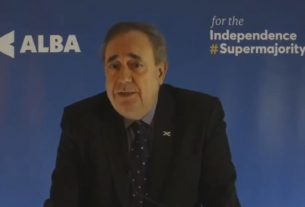The pound and UK stock markets have plummeted providing an immediate reaction to chancellor Kwasi Kwarteng’s mini-budget aimed to stimulate economic growth.
The £45 billion package of tax cuts announced today (September 23) is the biggest tax give-away for 50 years – but experts say that half the cuts in personal tax will line the pockets of the richest 5% of the population.
Kwarteng framed the mini-budget as a “fiscal event”, thereby evading the scrutiny and analysis of the Office for Budget Responsibility, the Treasury’s independent forecaster. However, the verdict of the market was immediate with the pound’s steep decline meaning the government’s massive borrowing is already far more expensive than it would have been just yesterday.
Sterling’s fall against the dollar became a nosedive with the pound plummeting under $1.09 even while the chancellor was still on his feet in the Commons delivering his “plan for growth”. The FTSE was down 2% (141 points) to close trading at 7,019.
Bank of England urged to act to ‘save the pound’
Oil, gas, petrol and almost all other imports will be more expensive for consumers, further fuelling inflation. Resultingly, the Bank of England (BoE) will almost certainly raise interest rates again next month. According to the Telegraph, the Bank has already been urged to call an emergency meeting next week to raise rates to try and rescue the pound from its lowest levels for 37 years.
Markets have been spooked by the scale of the tax giveaway and the amount of borrowing the government will have to take in order to pay for it. The Resolution Foundation said this will see £411 billion added to the UK’s national debt over the next five years.
This is on top of the £150 billion borrowed to pay energy companies in order to cap (average) household bills at £2,500 for the next two years. It is expected the energy support scheme will cost £60 billion for the six months from October.
Senior Tory MPs are despairing at Kwarteng’s intervention, saying it will prove “politically toxic and economically dubious”, the Guardian reports, because the measures so clearly benefit top earners as compared to everyone else not earning more than £155,000 a year.
The MPs – supporters of former chancellor Rishi Sunak – fear a repeat of the 1972 Conservative government’s “Barber budget” which saw comparable cuts as those announced today, also introduced to stimulate growth – only to create a boom that turbo charged rampant inflation and hastened the end of Ted Heath’s reign in Downing Street.
The Conservative supporting Telegraph reports that the budget has been criticised by Tory peers who believe the failure of the plan will “burn” the Tories’ reputation for sound economic competence.
Scrapping the top rate 45% tax band for the biggest earners (paid more than £150,000) will mean huge windfalls for the country’s richest – although it won’t apply in Scotland where the highest rate will remain at 46%.
Combined with the 1p cut to the basic rate of income tax (from 20% to 19%) and the national insurance U-turn reversing the 1.25% rise introduced to pay for social care, the reduction will see a worker earning £1 million a year getting a £40,000 boost, according to the Institute for Fiscal Studies (IFS). The IFS has accused the chancellor of “betting the house” and putting national debt on an “unsustainable rising path” to fund tax cuts that will only benefit people earning more than £155,000 a year, the Evening Standard reports.
As well as massive income tax cuts, Kwarteng’s mini-budget also confirmed cuts to stamp duty on house buying and a U-turn on the proposed rise in corporation tax. Plans for almost 40 investment zones – providing tax-breaks for businesses in England – were announced. The cap on bankers’ bonuses will also be scrapped while Kwarteng also pledged to remove “unnecessary complexity and cost” for businesses by reforming tax rules and scrapping regulations and EU laws.
Kwarteng also promised to speed up key infrastructure projects which will be “prioritised for acceleration”. Legislation to tackle “militant trade unions” is firmly on the agenda and laws will be introduced to make it harder for workers to strike.




